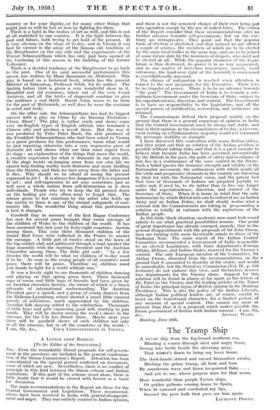A LETTER FROM BOMBAY. [To the Editor of the SPECTATOR.]
Sin,—Even the remarkably liberal proposals for self-govern- ment in the provinces are included in the general condemna- tion of the Simon Commission's Report. Attention has been concentrated on the special powers conferred on Governors, some of which are new. Nevertheless, there is no conflict of principle in this field between the Simon scheme and Indian aspirations. If this part of the scheme stood alone, there is little doubt that it would be viewed with favour as a basis for discussion.
The main recommendations in the Report are those for the Central Government and Legislature. These recommend- ations haVe been received in India with general disappoint: silent and anger. They run entirely counter to Indian opinion, and there is not the remotest chance of their ever being put into operation except by the use of naked force. The critics of the Report consider that these recommendations offer no further advance towards self-government, but on the con- trary are retrogressive. They point out that the popular basis of election is abolished, and that instead we are offered a couple of senates, the members of which are to be elected by the same local bodies in the same way, and are to be joined at some future date by the nominees of despots, who need not be elected at all. While the popular character of the Legis- lature is thus destroyed, its power is in no way augmented, and in one matter of first-class importance, namely, tariff autonomy, the hard-won right of the Assembly is condemned as constitutionally unsound.
The climax of indignation is reached when attention is turned to the new proposals for the Executive. There is to be no transfer of power. There is to be no advance towards the goal." The Government of India is to remain a sub- ordinate Government under the Secretary of State, subject to his superintendence, direction, and control. The Government is to have no responsibility to the Legislature, and all the special powers of certification, restoration, and ordinance are retained.
The Commissioners defend their proposal mainly on the ground that there is a general consensus of opinion in India that the Central Government must be strong and stable, and that in their opinion, in the circumstances of to-day, a Govern- ment resting on a Parliamentary majority would not command the necessary stability or strength.
I have discussed this contention with many Indian critics, and they point out that no solution of time Indian problem is possible without taking risks, and that it is a great mistake to believe that because India has been governed autocratically by the British in the past, the path of safety and avoidance of risk lies in a continuance of the same control in the future. Such a belief ignores the immense strength and vitality of the Nationalist movement, the enthusiasm with which nearly all the virile and progressive elements in the country are throwing in their lot with the Nationalist cause, and the patent fact that tens of thousands of Indians are prepared joyfully to sutler and, if need be, to die rather than to live any longer under the superintendence, direction, and control of the Secretary of State. When it is borne in mind that the only instruments by which British rule can be enforced are an Indian Army and an Indian Police, we shall clearly realize what a colossal risk the Commissioners are taking in propounding a solution so totally at variance with the aspirations of the Indian people.
In this truly black situation, moderate men must look round calmly to see what practical possibilities remain. One point of great importance has already emerged, namely, that in the general disappointment with the proposals of Sir John Simon, men are turning with more favourable minds to those of Sir Sankaran Nair. The main report of the Indian Central Committee recommended a Government of India responsible to an elected Legislature, with three departments, Foreign Affairs, Defence, and Indian States, reserved for the Viceroy's control. The only European member of the Committee, Sir Arthur Froom, dissented from the recommendation, on the • ground that it amounted to dyarchy at the centre, and would be unworkable, but the Statutory Commission [Vol. IL, p. 138 footnote] do not endorse this view, and themselves reserve two departments for the Viceroy alone. Support for this solution will be found in places as far apart as the letters of Mr. Patel to the Viceroy and the leading articles of the Times of India, the principal organ of British opinion in the Bombay Presidency. This is also the policy of the Indian Liberals, although Indian political leaders are, of course, careful to insist on the transitional character, for a limited period, of any measure of special control. One cannot say more at present than that it is a proposal which makes possible the future government of Indian with Indian consent.--I am, Sir,
















































 Previous page
Previous page